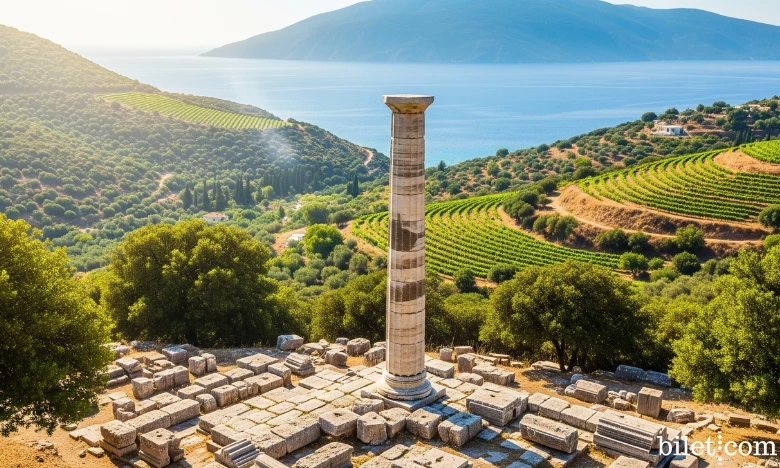Origin of Name: "Samos" and "Sisam"
Although there are various theories about the origin of the name Samos, the most common is related to the geographical structure of the island:Samos (Σάμος): The word "Samos" in ancient Greek is thought to be derived from the Phoenician word "sama", meaning "high place by the sea" or "hillside". This is a reasonable explanation, considering the mountainous structure and high hills of the island. Another theory is that it comes from a hero named Samos, one of the first inhabitants of the island, or a local god.
Samos: The Turkish name of the island, "Sisam", is an adaptation of the word "Samos" that has adapted to the phonetic structure of Turkish over time.
In the Lap of Mythology: The Birthplace of Goddess Hera
Samos Island has a very special place in Greek mythology, as it is considered the birthplace of Hera , the Queen of the Gods, wife of Zeus and goddess of marriage.The Holy Land of Hera: According to legend, Hera was born under a lygos tree on the banks of the Imbrasos River on the island. For this reason, Samos became one of the most sacred and important centers of worship of Hera. Located in the south of the island and one of the largest temples of the ancient world, Heraion is dedicated to the Goddess Hera and reflects her glory.
Dionysus and Wine: Samos is also associated with Dionysus, the God of Wine. According to legend, Dionysus taught the islanders how to grow grapes and make wine. Samos’ famous sweet Muscat wine is a delicious modern-day reflection of this mythological connection.
Bright Pages of History: From Polycrates to Pythagoras
Samos was one of the most powerful and rich city-states of the Aegean in ancient times.The Polycratic Period and the Golden Age: In the 6th century BC, under the rule of the tyrant Polycrates, Samos experienced a golden age in seafaring, trade and art. Polycrates established a huge navy and had magnificent structures built. The most famous of these are the expansion of the Heraion to gigantic dimensions, the Eupalinos Tunnel (an aqueduct through a mountain) which is considered one of the engineering marvels of the ancient world and the great breakwater of the ancient port at Pythagoreio.
Homeland of Great Thinkers: Samos is known not only for its powerful rulers, but also for its important figures who contributed to science and philosophy:
- Pythagoras (Pythagoras): The famous mathematician and philosopher Pythagoras was born in Samos. Known as the "father of numbers", Pythagoras left a deep mark on the history of mathematics and thought with the theorem that bears his name and his philosophical teachings.
- Aristarchus (Aristarchus): Aristarchus, the astronomer who first proposed the sun-centered universe model (heliocentrism), was also from Samos.
- Aesop: There are rumours that the famous fable writer Aesop also lived in Samos for a time.
Roman, Byzantine and Ottoman Periods: Samos maintained its importance during the Roman Empire, and it is known that Antony and Cleopatra even spent a winter here. The island, which was a bishopric during the Byzantine period, later came under Genoese and Venetian influence. Samos, which remained under Ottoman rule for a long time, gained the status of a semi-autonomous principality in the 19th century and was annexed to Greece in 1912.
Pearls Waiting to be Discovered in Samos
From its ancient ruins, listed as a UNESCO World Heritage Site, to its quaint fishing villages, from its lush valleys to its crystal clear beaches , Samos Island offers its visitors a wide range of experiences:Heraion and Eupalinos Tunnel: These two UNESCO World Heritage Sites near Pythagoreio showcase the island’s ancient splendor and engineering genius. The massive column ruins of Heraion and the impressive structure of the Eupalinos Tunnel are a must-see.
Pythagoreio: Named after the great mathematician, this charming port town is built on the site of the ancient city of Samos. It is a pleasant excursion spot with its Lykourgos Logothetis Castle, Roman baths and Archaeological Museum.
Kokkari: Located in the north of the island, Kokkari is one of the most popular tourist villages in Samos, with its colourful houses, lively harbour and beautiful beaches.
Vathy (Samos Town): The island's capital, Vathy is a cultural centre with hillside neoclassical buildings, the Archaeological Museum (where the giant Samos Kouros statue is displayed) and the Byzantine Museum.
Potami Waterfalls: Located in the northwest of the island, near Karlovasi, these waterfalls and the lush green nature around them are ideal for cooling off and hiking.
Samos Wine and Wine Museums: Your trip to Samos wouldn't be complete without tasting the island's world-famous sweet Muscat wine and visiting one of its wine museums.
Magnificent Beaches: Beautiful beaches such as Lemonakia, Tsamadou, Tsabou, Psili Ammos, Potokaki are waiting for you to enjoy the Aegean.
Now is the perfect time to plan a trip to Samos to wander the sacred lands of Hera, marvel at the engineering genius of Eupalinos, and experience moments of inspiration on the island of Pythagoras!







